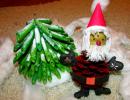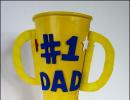Holy Week has begun: how to end the fast correctly. Is it okay to drink on Good Friday? What to eat during Holy Week by day
As you know, after Palm Sunday, Holy Week begins. For believers, this is considered a strict time in observing Lent. Especially for those who are trying to fully endure the fast. The desire to fully endure the fast is both useful and commendable. It is believed that some abstinence from protein foods, especially in the spring, is even very useful, and not vice versa, as many are mistaken. Some people, especially those who are starting fasting for the first time, do not know what they can include in their diet and what they can eat during Holy Week 2018.
First, you need to find out what foods you can eat during fasting. The diet may include a variety of cereals, legumes, beans, green peas, which in the Lenten menu saturate the body with the necessary protein. You also need to include vegetables in your diet, such as cabbage, lettuce, carrots, potatoes, pumpkin, and other vegetables. Fruits can be consumed raw, or added to salads or baked. You can prepare a variety of desserts from fruits. Mushrooms can be a substitute for meat and fish in a Lenten menu. From them you can prepare a wide range of dishes from soups to independent main courses.

Some people wonder whether it is possible to include seafood in your diet during fasting. Yes, you can eat seafood, but on certain days, that is, on Annunciation or Palm Sunday. The rest of the Lenten menu may additionally consist of dried fruits, canned vegetables and many other products, such as Korean salads, sweets, brown bread, tomato paste and others. But eating fish, meat and seafood is prohibited.
Holy Week 2018, what you can eat and what you can’t do, if necessary and not knowing, you need to contact the clergy in the church, they will completely give out the necessary information and tell you how to behave. This week is considered a busy time and a period of remembering the last days of Jesus' life. Since ancient times, such a week has been endowed with many deep prayers. During Holy Week, all kinds of entertainment and celebrations are prohibited, for example, weddings or birthdays, it is better to move them to other days.

Holy Week, what you can eat in 2018 and what you cannot include in your diet, we can say one thing, you will need to limit your food and preferably eat only vegetables and fruits. It is necessary to pray more and attend church services. It is also necessary to prepare for the main Eucharist in 2018 - Maundy Thursday. Some people are mistaken in asking whether it is possible to eat fish during Holy Week 2018. Holy Week is considered the strictest week of Lent and, of course, eating fish is strictly prohibited. You can only eat lean foods. Although the church advises that during such a week you should completely abstain from a busy menu and drink only water. There are exceptions, but only for pregnant women, children and people with serious illnesses.
For Orthodox people, Good Friday is the most mournful day of the whole year, when believers remember the martyrdom of Jesus on the cross, his crucifixion and burial. This is also the strictest day of fasting, when it is not customary to have fun, laugh, sing and dance, quarrel and swear, but it is better to pray more - as a sign of memory and sorrow for the tragic events that occurred in biblical times. According to the superstition, a person who laughs on Good Friday will cry all year. But fasting does not only imply moral behavior; it includes abstinence from food and drink.
The question of what you can drink on Good Friday is no less significant for believers than the question of what you can eat from food. According to the priests, on this mournful day you can eat and drink only after lunch, when the shroud is taken out at the church service. Moreover, true believers who observe strict fasting are allowed to consume only bread and water, and according to the fasting nutrition calendar, it is better to abstain from food and drink altogether.
There is even a rumor that if a person endures thirst on Good Friday, no drink can harm him for a whole year.
Of course, such strict abstinence is not recommended for young children, pregnant women and people with certain diseases - for obvious reasons.
Is it possible to drink tea on Good Friday?
As for tea (or coffee), drinking them as drinks on Good Friday is not forbidden, especially if you have not observed very strict rules. And although the calendar mentions that this is a day of dry eating, and it is recommended to drink only water, compotes and juices, there is a slight relaxation for tea. People engaged in strenuous physical or intense mental activities may find it difficult to do without a strong cup of sweet tea. But if you have the opportunity, it is better to give up this drink for one day - it is not as difficult as it seems at first glance.
Can you drink wine on Good Friday?
Orthodox people are often interested in the question of whether it is possible to drink alcohol on Good Friday and they ask it not out of idle curiosity, because some people may have some kind of secular holiday on this date, such as a birthday or wedding anniversary or something else. Of course, many people throw feasts on this occasion and invite guests. And any celebration in our country is always accompanied by alcohol; this is an integral part of the banquet.
The clergy, in turn, recommend completely abstaining from the use of strong alcoholic beverages on this mournful day, and moving the celebrations themselves to another date. And if there is a strict need, you can sip a little red Cahors. But this should be done not in connection with a celebration, in no case by clinking glasses or making toasts, but modestly and decorously during a Lenten meal. It’s good if the Cahors is consecrated by you personally in.
Every believer should spend Good Friday reflecting on his sins, praying and  repentance, and even one glass of wine drunk does not correspond to this in any way, this is worth taking into account.
repentance, and even one glass of wine drunk does not correspond to this in any way, this is worth taking into account.
Can you drink beer on Good Friday?
Opinions usually differ regarding the consumption of beer during Holy Week. On the one hand, this is a certain kind of alcoholic drink. On the other hand, beer is interpreted as a lean product. In any case, there is no strict ban on beer by the church. And if you have some need for this drink, you can make yourself a little concession in the size of a small glass.
In conclusion, I would like to note: no matter what a person drinks on Good Friday, the drink should not affect his moral behavior on this day.
Holy Week for Christian believers is a special period, not only the most difficult for the body, but also the brightest for the soul. Translated from Church Slavonic, “passion” means “trials and suffering.” Holy Week is dedicated to the events in the dying days of Christ's earthly life: the Last Supper, betrayal, suffering, crucifixion, burial and resurrection. The Holy Week before Easter is also popularly called Red and Clean Week.
Days of Holy Week
Each day of Holy Week begins with the name “Great” and has its own greatness and meaning.
Maundy Monday reminds us of the Old Testament patriarch Joseph, who was sold into slavery by his brothers, as a prototype of the suffering of Jesus Christ. We also recall the curse of the barren fig tree, symbolically showing the soul of a person without the fruits of faith, repentance and works of mercy.
On Maundy Tuesday, one reads about the denunciation of the Pharisees and scribes, the parables spoken by Jesus in the Jerusalem Temple.
On Holy Wednesday, the church remembers the betrayal of Jesus by his disciple Judas for 30 pieces of silver. Even on this day, a story is read about a sinner who prepared Jesus for burial, washing him with her tears and precious ointment.
On Maundy Thursday, in churches they read a passage from the Bible about the Last Supper, how the Savior washed the feet of the apostles.
Good Friday speaks of the torment and death of Christ on the cross.
On Holy Saturday the service speaks of Christ’s presence in the tomb and the consecration of Easter food takes place. On Saturday, an amazing and inexplicable phenomenon occurs in Jerusalem - the descent of the Holy Fire.

Benefits of fasting
Compliance with Orthodox fasting provides very great benefits for the human body. Some people perceive it as a diet and assume that it is only useful for overweight people. This is wrong. The post is useful to everyone. mainly consists of cereals, fruits and vegetables containing a lot of fiber. Such food, like a universal cleaner, rids the body of waste and toxins, normalizes weight and makes the body healthier. And they strengthen the body well. Reducing the volume of the stomach during fasting reduces the need for food, especially since fasting food is very healthy and nutritious. Fasting is useful for sick and healthy, thin and fat. There is an opinion that Orthodox fasts are difficult to observe; many expect hunger pangs. This is wrong. Those who try fasting are often surprised by how full they feel without eating meat. No pill can help cleanse and heal the body as much as fasting. Nowadays, you can easily make your Lenten meals varied thanks to many recipes. Therefore, the question of what to eat during Holy Week does not pose a problem.

Features of fasting days during Holy Week
Particularly strict fasting days occur before Easter. After a long forty-day fast, they are a great test. But the sweeter the holiday for those who were able to curb their womb. Holy Week before Easter encourages us to adhere to the second degree of fasting - dry eating. In this case, the usual rules include: refusal of meat and vegetable oil, cooking without any heat treatment (boiling or frying) is added, and on Friday and Saturday complete abstinence from any food is prescribed. However, this is a requirement of strict monastic order. Orthodox Christians take a blessing for this from a priest. Fast days should be carried out according to strength and health conditions. This process can be of different degrees:
- refusal of meat;
- plus giving up dairy products, including cheeses and butter;
- plus giving up eggs and all dishes containing them;
- plus giving up fish, etc.
In addition, during Lent it is necessary to reduce the volume of dishes, and especially during Holy Week.

Menu for Holy Week
The modern church charter is based on the rules for monks. For fasting laymen there is their own charter - the Old Russian Typik, used since the 12th century. It spells out what to eat during Holy Week, that the laity need to act “according to their strength” - in accordance with different life situations. There are concessions for the elderly, the sick, pregnant and lactating women, children, etc.
You should aim to eat one meal a day. The food should consist of raw vegetables with bread and water. Even with such strict rules as Holy Week, the menu can be quite varied.
On Holy Monday, Tuesday and Wednesday, dry eating is prescribed - cold food without vegetable oil, unheated drink.
Breakfast: vegetable or fruit salads, for example, cabbage-prunes or apple-cabbage with orange sauce, or topped with coconut-orange ambrosia.
Lunch: beet or carrot salad, potatoes with mushrooms or grated carrots with oranges.
Dinner: spicy carrots, pickled cucumbers, carrot and nut salad.
If you prepare the dishes suggested, or prepare something of your own, keep in mind that if the recipe contains oil, simply exclude it.
On Maundy Thursday you are allowed to eat boiled vegetables with butter and a small amount of wine.
Breakfast: apple and apricot soup, with apple or jam.
Lunch: “Motley salad”, vegetable or dried fruit soups, sweet pie with berries.
Dinner: vegetable soup or stew with vegetables and rice,
On Friday we try to abstain from food altogether. Only at three o'clock in the morning is it allowed to take some bread and water.
On Saturday you should also abstain from food if possible. If this is difficult for you, you can create a menu like this:
Breakfast: oatmeal soup with quince or cold soups with dried fruits, bread.
Lunch: potato soup, cabbage rolls with prunes and rice.
Dinner: bean soup with sweet peppers or mushroom solyanka.
When considering soup recipes, vegetable oil is easily omitted if you do not fry the recommended products in it, but simmer them in water or immediately add them to the soup without additional heat treatment.

What not to do during Holy Week
According to the traditions of the Orthodox Church, Christians spent this week in prayer, observed the strictest fasting, and tried to attend church every day. There was a ban even on loud conversations, laughter, singing songs and having fun. Nowadays, few observe Great Lent, and especially the strict rules of Holy Week, and even fewer attend church. The Church teaches that refusing to eat certain foods means little without spiritual fasting. It consists of prayers, doing good deeds, good thoughts, etc. If you have a desire to fast, and you are thinking about what to eat during Holy Week, remember the words of Theophan the Recluse: “Fasting seems gloomy until one enters into the field of it...”.
Spiritual fasting has its own “menu”: with it, a person “... avoids anger, rage, malice and revenge, avoids idle talk, foul language, idle talk, slander, condemnation, flattery, lies and all slander... a true faster is one who flees from all evil...", commands the Holy Church.
During Lent, and especially during Holy Week, sex life is also prohibited. Kisses between husband and wife are allowed only in the dark. What you cannot do during Holy Week is to sing, have fun, dance, laugh, attend any entertainment and entertainment events, holidays, birthdays and weddings, and give up extraneous thoughts. According to the monastic charter, it is forbidden to sit down at the table more than once a day; this is allowed only after sunset. On Good Friday it is also not recommended to do housework or wash yourself.
Therefore, when taking part in preparations for the most important Christian holiday, think not only about what to eat during Holy Week, but also how to fast spiritually.

Traditions of Easter week
This week is full of traditions and rituals for every day; it is customary to start putting things in order not only in the soul, but also in the house. During Holy Week, a thorough general cleaning of the house was carried out - ceilings were whitewashed, walls were painted, rugs were washed, curtains were starched. The most beautiful tablecloths and napkins came from chests and chests of drawers.
There is a beautiful tradition of releasing birds into the wild on Annunciation Day. In 2015, this holiday fell on Maundy Tuesday. Nowadays, the clergy symbolically releases tame pigeons. Animal rights activists recommend not buying wild birds from hunters and poachers, who are trying to profit from the suffering and death of birds, since birds often die after the stress of captivity.
Secrets of Lent: a glass of water before breakfast and pasta for dinner
Today began the strictest week of Lent - Holy Week. During these days before Easter, believers are strictly forbidden to eat meat, eggs, milk and milk-based products, fish and alcohol.
Meanwhile, strictness also has its own nuances. How should you eat during the last week of fasting? What foods are best to combine with meals these days? And also how to break fast without causing harm to your health? - on the eve of Easter, a MK correspondent found out.
Pasta in tomato sauce
Holy Week is the last week before Easter - it began on April 14 and ends on April 20 - the Resurrection of Christ. This is the last, strictest (or “strict”) week of Lent - it begins on Holy Monday. It should be noted that the last Holy Week is distinguished by strictness in food. During Holy Week, the Church prescribes strict fasting, excluding meat, dairy, eggs and fish foods. The monks, of course, keep a strict fast, sitting, as a rule, on these days only on bread and water. The laity is allowed to slightly diversify the range of products.
We must remember that fasting is not a diet. First of all, a person limits himself in pleasures and pays attention to his spirituality, says Kirill Zebrin, a member of the National Guild of Chefs. - And food restriction is only part of fasting.
The most important thing, according to the chef, is not to overeat during fasting (even if you only eat foods of plant origin). At the same time, you need to eat slowly, chewing your food for a long time.
Kirill advises eating different foods during fasting.
In the morning before breakfast, you need to drink a glass of water with a few drops of lemon so that the intestines begin to work. For breakfast, you can cook oatmeal in water with nuts and dried fruits. And wash it down with green tea and honey,” he explains.
For lunch or dinner, the chef suggests preparing a fairly simple but tasty dish: pour dry pasta into a deep frying pan, add frozen or fresh vegetables and dry herbs on top. Pour the resulting mixture with tomato juice and water (just to cover). Then add a little olive oil, bay leaf, salt and cook over medium heat for 15-20 minutes. By the way, you can replace pasta with cereals, for example, buckwheat, and instead of olive oil, add regular vegetable oil. It should also turn out very tasty.
Three eggs is the norm
Meanwhile, according to nutritionists, you need to break fast very carefully. The body requires a certain adaptation period.
During fasting, we refuse food of animal origin, replacing it with plant foods, says nutritionist Elena Zlatinskaya. - And animal food requires the body to secrete special digestive enzymes that help digest it. During fasting, practically no such enzymes are released. Therefore, when a person suddenly starts eating meat, smoked meats or some other fatty foods, and even in large quantities, the body may experience stress. And as a result - indigestion. Acute abdominal pain, constipation, and even acute pancreatitis may develop.
The first week after fasting, you can start with lighter foods of animal origin: boiled or steamed fish and chicken, cottage cheese, vegetables, vegetable soups, porridges. And also do not abuse alcohol, explains Elena Zlatinskaya. - It’s also better not to drink milk at first, but replace it with fermented milk products - for example, kefir and yogurt.
According to the specialist, milk contains a lot of so-called milk sugar, which is quite difficult to digest in the adult body. And some people do not digest milk at all. Therefore, you should take care of your stomach.
It is also very important to eat properly when breaking fast. According to the nutritionist, you need to eat fractionally - 5-6 times a day in small portions. And of course, the last meal should be no later than 2 hours before bedtime.
In general, as it turns out, eggs are a rather heavy product.
The norm for consuming eggs for an adult is three eggs per week, says Zlatinskaya. Why?
It turns out that the yolk itself is a very fatty product and contains a lot of cholesterol. Egg whites are digested faster, but, you see, none of us will specifically separate the whites from the yolks.
Of all the forms of preparing eggs, according to the expert, omelet is the best digestible one. Worse are hard-boiled eggs and simply fried in a frying pan. But the most problematic thing to digest in the body (who would have thought!) is a raw egg.
Raw eggs contain a substance called ovidin, which greatly complicates the digestion process, explains the specialist. - When preparing the product, this substance is neutralized.
In general, nutritionists even advise creating a diet for the entire Easter week - it will help the body gradually adapt to the digestion process in new conditions with a full range of products.
All days of Holy Week are special and are called Great or Passionate, and Old Testament stories are closely intertwined with what happens in the last days of the earthly life of Jesus Christ.
During Holy Week, Orthodox churches hold special services that are considered the most majestic and solemn of the entire church year.
During Holy Week, the dead are not commemorated, the days of saints are not celebrated - at this time all rituals are dedicated to preparation for Easter or the Holy Resurrection of Christ.
I asked what the days of Holy Week are dedicated to and what can and cannot be eaten by day.
Holy Week by day
Holy Monday - at church services on this day they remember the Old Testament Patriarch Joseph, whom his brothers sold into slavery, as well as the curse of the sinful fig tree by Jesus Christ, which brings neither faith, nor prayers, nor true repentance.
The rite of making peace also begins on Monday - it is made from a mixture of fragrant resins, vegetable oils and fragrant herbs and boiled while reading prayers continuously for three days.
On Holy Tuesday, churches remember the sermons of Jesus Christ about how the Savior spoke in the Jerusalem Temple, about the parables told to the disciples, about the talents and ten virgins, the resurrection of the dead and the Last Judgment.
On Great Wednesday, they remember the betrayal of Judas Iscariot, who betrayed the Teacher for thirty pieces of silver, as well as the sinner who washed the Savior’s feet and anointed them with myrrh. On Wednesday people try to go to confession.
On Passion or Maundy Thursday, the Orthodox Church remembers the Last Supper of Jesus Christ with His disciples and His establishment of the Sacrament of the Eucharist (Holy Communion). On Thursday the congregation receives communion.
Red or Good Friday is a day of mourning; during the service they remember the suffering of the Savior on the cross. The shroud, an image of Christ lying in the tomb, is taken out of the altar, and the believers bow before it.
On Holy Saturday, at a solemn service they talk about the burial of Jesus Christ and his stay in the tomb. At the same time, priests already on this day put on light festive vestments. Easter cakes, colored eggs and Easter eggs brought to the temple by people are illuminated.
In Jerusalem, in the Church of the Resurrection of Christ, the Holy Fire descends on Saturday, and the most important service begins in the evening - believers celebrate Easter.
What you can and cannot eat by day
All restrictions of Lent also apply to Holy Week, but the last week is the strictest. During the entire week, some believers, if desired, take only water and bread.
In Holy Week, according to the monastic charter, dry eating is allowed on Monday, Tuesday, Wednesday and Thursday, that is, bread, water, fruits, and vegetables are allowed.
These days you can eat lean bread and thermally unprocessed food. That is, raw vegetables and fruits, as well as dried fruits, nuts, honey. It is not recommended to take tea and compote these days.
These days you can prepare salads from vegetables and fruits. For example, cut any fruit - pears, oranges, apples, bananas, add chopped dried fruits, raisins and nuts, and season everything with liquid honey. It will turn out tasty and very healthy.
According to church canons, on the last Friday before Easter there is no food until the evening service.
Holy Saturday is the last day before the Holy Resurrection of Christ, when the Lord Himself was in the Tomb; believers observe strict fasting.
In 2019, the last Saturday before Easter falls on April 27. Orthodox Christians celebrate Easter on April 28 in 2019.
Seriously ill people, pregnant women, military personnel, workers engaged in heavy physical labor, travelers, nursing mothers, as well as children under seven years of age are exempt from fasting.
The material was prepared based on open sources






